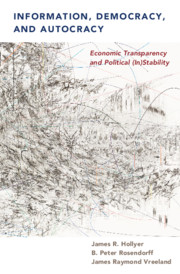Book contents
- Frontmatter
- Dedication
- Contents
- Figures
- Tables
- Acknowledgments
- 1 A New Approach to the Study of Transparency
- PART I FACETS OF TRANSPARENCY
- PART II POLITICAL (IN)STABILITY
- PART III WHY DISCLOSE
- 8 Transparency and Investment
- 9 Why Democracies Disseminate More Data than Autocracies
- 10 Why Autocrats Disclose
- CONCLUSION
- References
- Name Index
- Subject Index
9 - Why Democracies Disseminate More Data than Autocracies
from PART III - WHY DISCLOSE
Published online by Cambridge University Press: 17 September 2018
- Frontmatter
- Dedication
- Contents
- Figures
- Tables
- Acknowledgments
- 1 A New Approach to the Study of Transparency
- PART I FACETS OF TRANSPARENCY
- PART II POLITICAL (IN)STABILITY
- PART III WHY DISCLOSE
- 8 Transparency and Investment
- 9 Why Democracies Disseminate More Data than Autocracies
- 10 Why Autocrats Disclose
- CONCLUSION
- References
- Name Index
- Subject Index
Summary
Are democracies more transparent than autocracies? Some would seek to answer this question by definition. The current secretary general of the OECD, Angel Gurria, identifies transparency as a key ingredient “necessary for the functioning of democracies.” Many people agree: transparency has become synonymous with democracy. As Shapiro (2003: 200) suggests, “democratic leaders can never be entirely free from a commitment to truth-telling.” One could argue that if a country lacks transparency, it is simply not a democracy.
But should we assume, by definition, that democracies inherently seek to disseminate more data than autocracies? Doing so would preclude important questions, such as whether electoral competition leads governments to provide honest assessments of the economy or whether it causes governments to hide the truth.
Indeed, their vulnerability to public disapproval through elections may make democratic officials more inclined to obfuscate or withhold information concerning the performance of their policies than their autocratic counterparts – who need worry less about public perceptions. Political scientists and economists, in fact, have offered theories and evidence that the policymaking of democratic governments is shaped by issues of information revelation. Importantly, democratic governments have incentives to obfuscate (see, for example, Beitz 1989; Busch 2000; Stasavage 2004; Kono 2006; Rejali 2007; Mani and Mukand 2007; Culpepper 2010; Harding and Stasavage 2014; Jacobs and King 2016).
Still, governments that survive by winning elections also have incentives to disclose economic data. The previous chapter reveals an association between transparency and investment. If investment improves economic welfare, which, in turn, influences elections, democratic governments may do well to provide transparency. In fact, Chapter 8 shows that the association between transparency and domestic investment appears stronger for democracies than for autocracies. This chapter builds on these results, investigating whether the economic advantages of transparency hold more value for democrats than for autocrats. We examine whether electoral contestation provides incentives for governments to disseminate data.
Note that this inquiry requires distinct conceptions of democracy and transparency, where one term is not directly defined by the other. As discussed in Part I, many definitions of transparency include explicit references to democracy, and vice versa. Any empirical relationship between such variables would, at least partly, constitute a tautology.
- Type
- Chapter
- Information
- Information, Democracy, and AutocracyEconomic Transparency and Political (In)Stability, pp. 247 - 268Publisher: Cambridge University PressPrint publication year: 2018



